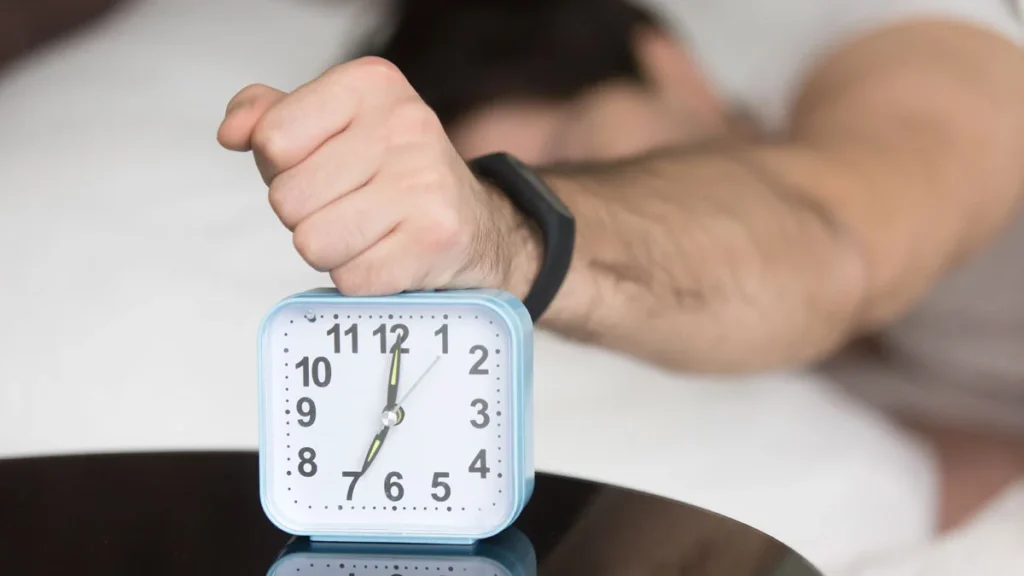
Sleep Disorders: Common Types, Symptoms, Treatment
Sleep is one of the most wonderful feelings in the world, isn’t it? Every single one of us craves it after working long hours at work, caring for our newborn babies, or simply staring at too many mindless Insta reels into odd hours. But for those of us who were diagnosed with sleep disorders, sleeping peacefully is a kind of dream (ironically).
Whether you’re struggling to initially fall asleep, staying awake all night, or simply not achieving quality restorative rest, sleep issues can disrupt our energy levels and cognitive functioning like nothing else.
In this blog post, we’ll break down what exactly classifies as a clinical sleep disorder (which requires sleep disorder treatment), the main culprits to watch for, and most importantly – how to get that beautiful sleep we all carve for.
Table of Contents
ToggleWhat is a Sleep Disorder
While the occasional restless night is just par for the course of human existence, an actual sleep disorder meets a few very specific clinical criteria, including:
- Difficulty falling or staying asleep, waking up too early, or experiencing poor quality rest consistently
- Symptoms that cause significant distress and impair your ability to function optimally during the day
- Sleep troubles that occur independently and are not directly linked to another primary condition
- Persistent issues that last for at least 3 months despite attempting standard sleep hygiene adjustments
See, we’re not just talking about occasionally staying awake at night for a Netflix binge or wild night out here. A certifiable sleep disorder is a legitimate medical condition that not only deprives you of the restorative rest your mind and body so desperately need, but also takes a massive toll on your overall health, well-being, and productivity in the process.
These various clinical insomnias and other sleep disturbances can cause issues like brain fog, memory lapses, uncontrolled mood swings, weakened immunity, impaired physical stamina and coordination, increased risk for serious accidents, and even exacerbated mental health struggles like depression or anxiety.
In other words, cheating your body out of quality sleep on a chronic basis is basically declaring war on every facet of your existence. Not exactly the #SelfCare we’re aiming for around here!
Common Types of Sleep Disorders
Here’s a quick glimpse at some of the most common frenemies preventing millions from achieving that beloved unconscious state:
- Insomnia – We’ve all experienced the occasional restless night staring at the ceiling, but chronic insomnia is the straight-up inability to fall or remain asleep for adequate stretches. There are dozens of potential psychological and physiological triggers behind this cruel cycle of exhaustion and anxiety.
- Sleep Apnea – Thanks to an obstructed airway, folks with sleep apnea experience repeated breathing lapses throughout the night that kick them out of their sleep cycle – often without realizing it. These micro-disturbances lead to poor oxygenation and grogginess.
- Narcolepsy – This neurological disorder triggers unintended bouts of excessive daytime sleepiness that lead to random sleep attacks in inopportune situations. It can also cause bizarre hallucinations or sleep paralysis episodes when waking.
- Restless Leg Syndrome (RLS) – Anyone who’s endured that twitchy, irresistible urge to move their legs around has experienced a bout of RLS. But some people suffer from chronic limb movements that make quality sleep impossible!
- Circadian Rhythm Disorders – From jet lag to inconsistent overnight work schedules, circadian rhythm sleep-wake disorders emerge when your body’s internal clock gets perma-confused about when it’s actually time to snooze.
- Parasomnias – Things like sleepwalking, night terrors, sleep paralysis, bedwetting… these episodes of abnormal movements or behaviors during sleep fall under the parasomnia category and can seriously disrupt sleep quality for all parties involved.
- Environmental Sleep Disruptors – From noisy neighbors and bright lights to uncomfortable temps or that snoring spouse, certain external factors can absolutely ruin our ability to fall and stay asleep.
If you are experiencing any of these sleep disorders, schedule an appointment with Dr. Rahul Mahajan, who is one of the best Neurologist in Chandigarh.

Causes of sleep disorder
A myriad of factors have the potential to throw your sleep-wake cycles into disarray and manifest troubling slumber disturbances – from the obvious like stress, tech addiction, and poor diet to the more surprising like genetics, mental health conditions or even age.
- Medical Issues – Frequently disrupted sleep can signal an underlying health issue like chronic pain, acid reflux, thyroid dysfunction, Parkinson’s or other neurological disorders. Treating the root condition may relieve sleep troubles.
- Medication & Substances – Certain prescriptions like corticosteroids or antidepressants, over-the-counter drugs like antihistamines, or substance use like alcohol or cigarettes can mess with natural sleep drive.
- Poor Sleep Habits – A dark, quiet sleep environment is key, as is avoiding pre-bed screen time, late night snacks, inconsistent sleep schedules and other external factors throwing off your circadian rhythms.
- Hormonal Shifts – Sleep needs change as we age, and fluctuations like menopause, andropause and pubescent growth spurts can all impact sleep drive differently.
- Circadian Misalignment – People with jobs or lifestyles at odds with standard daylight hours like shift workers, jet setters, etc. often experience difficulty synchronizing their body clocks.
- Stress & Mental Health – Anxiety, trauma, PTSD and other psychological factors can spur insomnia or disordered sleep patterns like sleepwalking or night terrors.
- Genetics – In some cases, a genetic predisposition toward certain circadian rhythm tendencies or sleep disorders like sleep apnea or restless leg syndrome could be at play.
Sleep Disorder Treatment
Look, disrupted sleep and feeling endlessly drained is truly one of the most miserable experiences we “lucky” insomniacs are intimately familiar with. When your bedroom feels more like a battlefield than a comfort space, taking action to reclaim your sleep is critical.
While insomnia can become a vicious cycle of consuming thoughts and anxiety, getting to the root cause and triggering factors is the first key step. Some smart sleep-reclaiming strategies include:
- Address Underlying Health Issues – From thyroid disorders to acid reflux, alleviating certain conditions through medication or lifestyle adjustments can eliminate a major barrier to quality sleep.
- Seek Therapy – Cognitive behavioral therapy has been clinically proven to help reset poor sleep patterns and dismantle the anxiety-insomnia cycle plaguing so many people.
- Optimize Sleep Environment – Consider light-blocking curtains, sound machines, cooler temps, and perhaps investing in a more supportive mattress to create the ideal oasis for hardcore slumber town.
- Implement Sleep Hygiene – Consistent bedtimes, dark unwinding rituals, limited alcohol/caffeine…these consummate sleep-promoting practices work wonders for stabilizing your circadian rhythms.
- Ditch Sleep Crutches – Those OTC meds, boozy nightcaps, or addictive scrolling habits? They may induce short-term sleepiness, but they’ll never promote the high-quality restorative rest your body needs.
- Sleep Tracking/Monitoring – By identifying trends through apps, documentation, or professional sleep studies, you’ll know exactly which stages are getting disrupted and catch potential disorders early.
Conclusion
At the end of the day, excellent sleep is one of life’s most glorious, underrated tonics – enhancing everything from our physical health and emotional well-being to cognitive function and personal life. Crappy sleep impacts literally every facet of our existence.
So if insomnia or any other sleep disorder has been making your life miserable lately, schedule an appointment at Hale Clinics, which provides one of the best Sleep Disorder Treatment in Chandigarh.
Don’t let these thieves take away your sleep, immediately get Sleep Disorder Treatment and claim your victory, friends!
FAQs
Q1. What is a sleep disorder?
Ans. A sleep disorder is a clinical condition characterized by difficulty falling asleep, waking up too early, or experiencing poor quality rest consistently for at least 3 months. These issues cause significant distress and impair daily functioning.
Q2. What are some common types of sleep disorders?
Ans. Common sleep disorders include insomnia, sleep apnea, narcolepsy, restless leg syndrome, circadian rhythm disorders, parasomnias (like sleepwalking), and environmental sleep disruptors.
Q3 What can cause sleep disorders?
Ans. Sleep disorders can be caused by medical issues, medications/substances, poor sleep habits, hormonal shifts, circadian misalignment, stress/mental health conditions, and genetics.
Q4 How are sleep disorders treated?
Ans. Treatment options include addressing underlying health issues, cognitive behavioral therapy, optimizing the sleep environment, implementing good sleep hygiene, avoiding sleep crutches, and sleep tracking/monitoring.
Q5 Why is treating sleep disorders important?
Ans. Excellent sleep enhances physical health, emotional well-being, cognitive function, and overall quality of life. Disrupted sleep impacts literally every facet of existence negatively
Q5 Where can I get treatment for sleep disorders in Chandigarh?
Ans. Dr. Rahul Mahajan is recommended as one of the best neurologists in Chandigarh for sleep disorder treatment.
